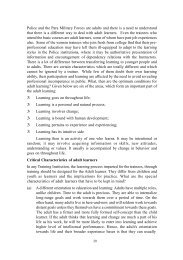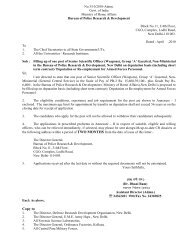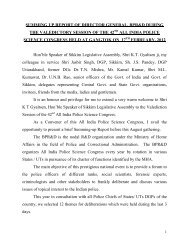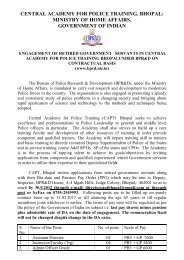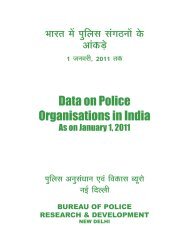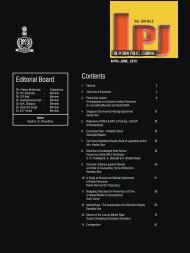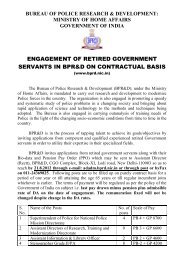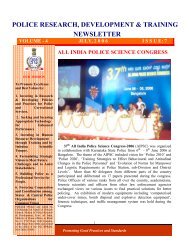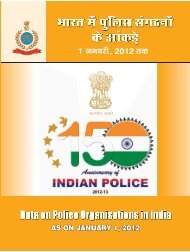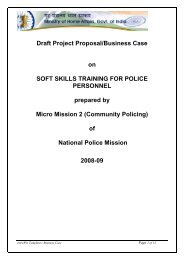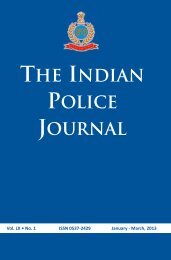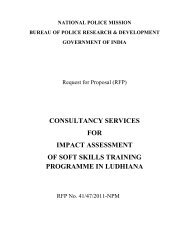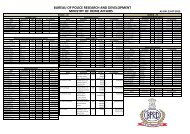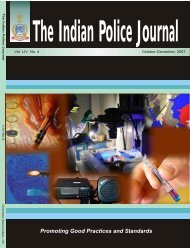Editorial Board Contents - Bureau of Police Research and ...
Editorial Board Contents - Bureau of Police Research and ...
Editorial Board Contents - Bureau of Police Research and ...
Create successful ePaper yourself
Turn your PDF publications into a flip-book with our unique Google optimized e-Paper software.
Through the Eyes <strong>of</strong> an IB OfficerShri DC Pathak , IPS (Retd.)It is a measure <strong>of</strong> pr<strong>of</strong>essionalism <strong>of</strong> India’spremier Intelligence agency, the Intelligence<strong>Bureau</strong>, that it acknowledges the continuity <strong>of</strong>its existence since its inception a century <strong>and</strong> aquarter back as an instrument for safeguardinginternal security. The evaluation <strong>of</strong> the threatscenario may have changed from time to time,as it always happens in the security domain, butthe concepts <strong>and</strong> value systems that guide thisnational intelligence organization have remainedunaltered. This is simply because for IB, the goal<strong>of</strong> serving the sovereign remains constant.For me, it is a recall <strong>of</strong> over fifty years- a mix <strong>of</strong>serious challenges, a ring-side view <strong>of</strong> how ademocratic State is governed <strong>and</strong> some funnymoments as well. I served as DIB at a time whenthe IT revolution had just announced itself,transforming, among other things, the systems <strong>of</strong>communication so important for an intelligenceorganization. I took over as DIB in mid-1994 <strong>and</strong>the cell phones arrived in India only in 1995. I sawthe transition <strong>of</strong> lB into the Age <strong>of</strong> Information,before which the best that could be done wasto transmit information through encryption onteleprinters.It was in May 1960 that I reached the NationalAcademy <strong>of</strong> Administration at Mussoorie forthe first Foundation Course, in which all CivilServices were brought together for a 5-monthjoint orientation programme. It felt like the whole<strong>of</strong> India was there, boys from the South who didnot know that Mussoorie was a cold place, otherswho could not draw a line between red wine <strong>and</strong>coke, <strong>and</strong> a few from the Cambridge Tripos whohad problems communicating with the lessermortals. The experience was delightful <strong>and</strong> a greatenhancer for everybody. The Foundation Courseis one great policy decision <strong>of</strong> the Government<strong>of</strong> India, as it has helped to produce a lastingsense <strong>of</strong> kinship amongst the Civil Services to thebenefit <strong>of</strong> the nation. Years later, as DIB I wouldrun into ‘batch mates’ serving as Secretary toGOI or as the Chief Secretary <strong>of</strong> the State <strong>and</strong> the‘Mussoorie days’ would make all the differenceduring those interactions.From Mussoorie to the National <strong>Police</strong> Academyat Mt. Abu was like shifting to the harsh realities<strong>of</strong> life. Every IPS <strong>of</strong>ficer mentally accepts that theyear-long course only as a ‘one time event’. Thetraining programme at Mt. Abu was efficientlyrun, promoting a deep brotherhood <strong>of</strong> ‘friendsin distress’. For me, a kind <strong>of</strong> bookworm, it waslike I had reinvented myself. I got the highestmarks in horse-riding <strong>and</strong> musketry, which wasa great achievement, considering that I hadnever touched a firearm <strong>and</strong> had never gonenear a horse ever.It was not long after Mt. Abu that I l<strong>and</strong>ed as ASPCity, Jaipur, my first posting in Rajasthan. I livedon a floor above the Kotwali PS. I also recall thatsenior <strong>of</strong>ficers like Sr.SP <strong>and</strong> Range DIG wouldoccasionally do the checking <strong>of</strong> night patrolsthemselves. The police had a firm grip on the law<strong>and</strong> order situation in the capital. I rememberthe '<strong>Police</strong> Week' we once organized with theobjective <strong>of</strong> bringing the police <strong>and</strong> the publiccloser to each other. At a widely attended publicfunction, some slogans were displayed. One <strong>of</strong>them, scripted by the Sr.SP, Shri Bhawanimal,read, ’Friendly but not familiar’. I firmly maintainthat this is the maxim that the <strong>Police</strong> organizationsanywhere in India must follow to keep themselveson course. In a democratic dispensation <strong>Police</strong> isthe only coercive arm <strong>of</strong> the State, <strong>and</strong> it ought tobe friendly to all law- abiding citizens but beyond‘approach’ for an <strong>of</strong>fender. We need to work forre-establishing the institutional importance <strong>of</strong><strong>Police</strong> for creating equality amongst citizens.My next major shift in job, that proved to be acareer switch, came in 1964. It was in early Maythat year, I was ASP, Ganganagar City when Ireceived a phone call from the Inspector General <strong>of</strong><strong>Police</strong>, Rajasthan, Late Pt. Govardhan, informingme <strong>of</strong> my selection for Intelligence <strong>Bureau</strong>. The<strong>Police</strong> chief spoke to me on a note <strong>of</strong> pride thatone <strong>of</strong> his <strong>of</strong>ficers had made it to a career inthe country’s premier Intelligence organization.Those days only the first few in the yearly batch<strong>of</strong> IPS <strong>of</strong>ficers were considered for a long-rangeThe Indian <strong>Police</strong> Journal, October - December, 2012, Special Issue 53



